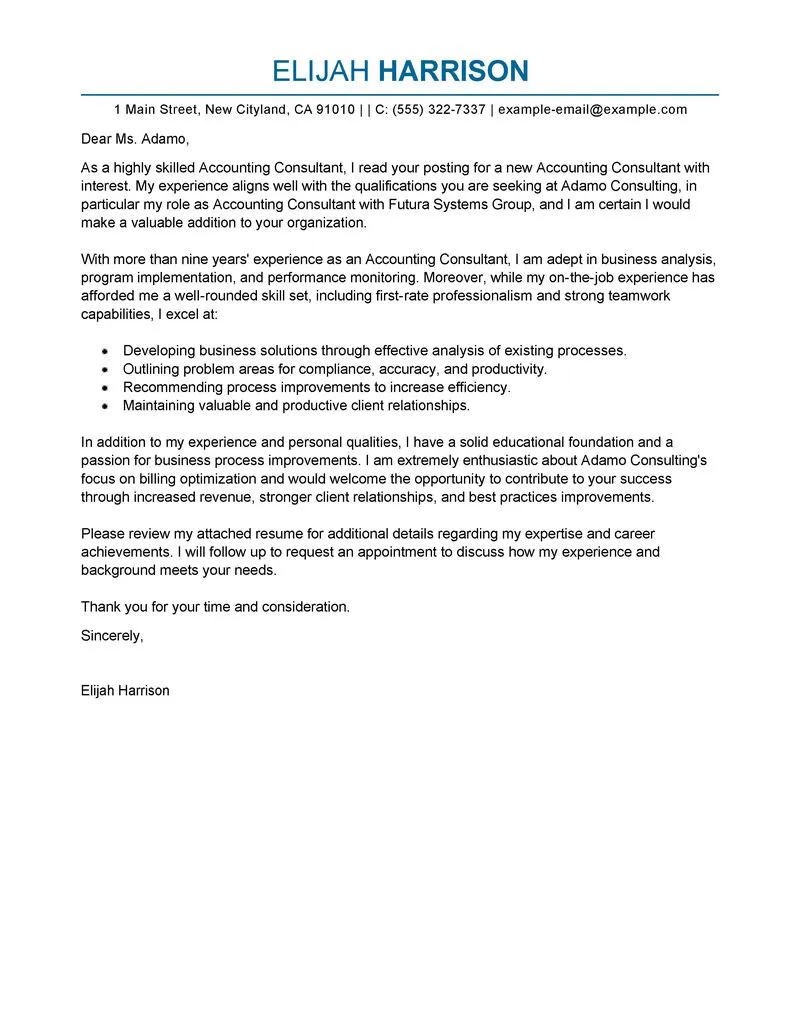Why a Strong Consulting Firm Cover Letter Matters
In the competitive world of consulting, a well-crafted cover letter can be your golden ticket to securing an interview. It’s not just a formality; it’s your first opportunity to make a strong impression and differentiate yourself from other applicants. A compelling cover letter provides a platform to showcase your unique skills, experiences, and passion for consulting. It allows you to connect your qualifications directly to the specific requirements of the role and the values of the firm. A thoughtfully written cover letter can turn a generic application into a personalized narrative that grabs the hiring manager’s attention, increasing your chances of landing an interview and ultimately, your dream job.
Understanding Consulting Firm Cover Letter Structure
A clear and concise structure is crucial for a cover letter to be effective. Begin with your contact information and the date, followed by the hiring manager’s details. The body of the letter should be organized into logical paragraphs, each addressing a specific aspect of your qualifications and interest. A strong opening, highlighting your enthusiasm for the role and the firm, is essential. Subsequent paragraphs should delve into your relevant experiences and skills, providing specific examples and quantifying your achievements. The letter should conclude with a confident closing, reiterating your interest and inviting further contact. Remember to maintain a professional tone throughout, keeping the language clear, concise, and easy to understand. Aim to provide a clear narrative that guides the reader through your experience and why you’re a great fit.
Key Components of a Consulting Firm Cover Letter
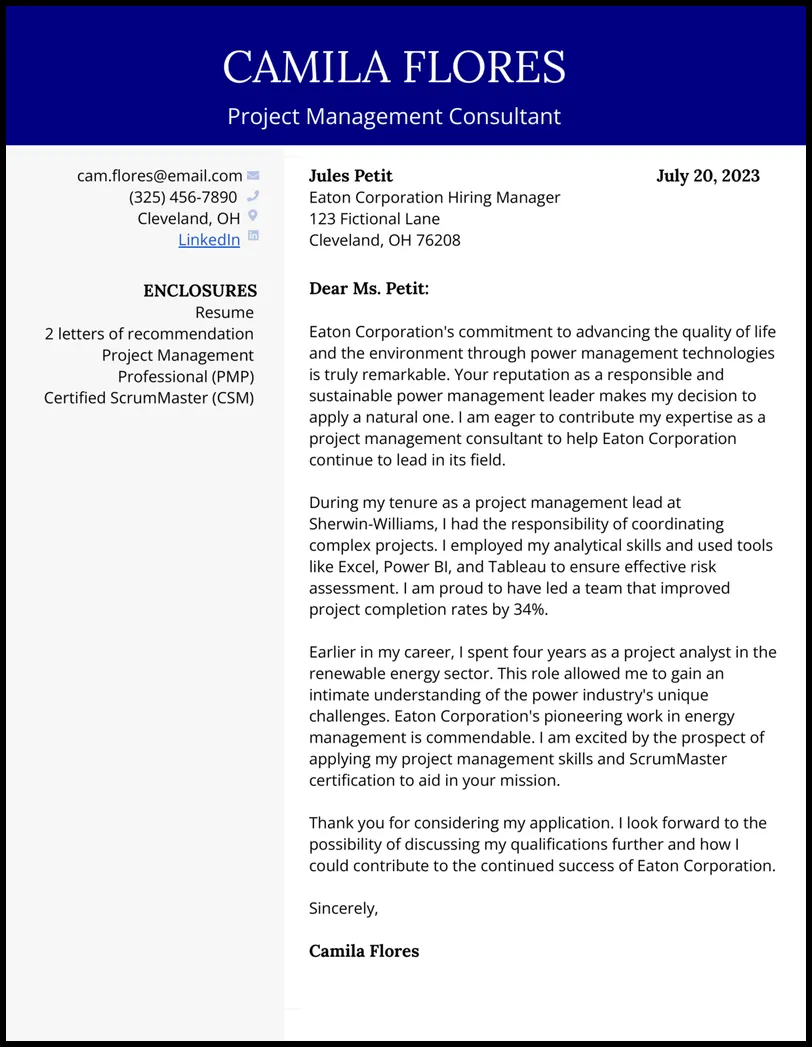
Several key components contribute to a successful cover letter. These elements should be incorporated seamlessly, and thoughtfully into your letter to illustrate your suitability for the role. Ensure that you are providing the hiring manager with all the information required to ascertain whether you are a good fit for the consulting role. Your contact information, including your name, address, phone number, and email, should be prominently displayed at the beginning of the letter. The body of your letter needs to be well-written, and should focus on showcasing your skills, accomplishments and expertise. A well-structured and professional letter is the key to getting you the consulting job you want.
Your Contact Information and the Date
At the top of your cover letter, include your full name, address, phone number, and professional email address. Following this, add the date. This information allows the hiring manager to easily contact you. Ensure your email address is professional, as it reflects your attention to detail and professionalism. Using a clear and legible font for this section is also recommended. This section seems easy, but it is one of the first things a hiring manager reviews when they get your cover letter, so it is important to include all the necessary information to make it as easy as possible for the hiring manager to contact you.
Addressing the Hiring Manager
Personalize your cover letter by addressing the hiring manager by name. Research the firm and identify the appropriate contact person. If the name isn’t readily available, use a professional salutation such as ‘Dear Hiring Manager’. This personalized touch demonstrates your genuine interest in the role and the firm, showing that you’ve taken the time to learn about the company and the opportunity. Avoid generic greetings, as they can give the impression that you’ve sent a mass application. Always double-check the spelling of the hiring manager’s name and title to ensure accuracy, as this reflects professionalism and attention to detail. Using the correct title is a sign of respect and an easy way to make a good impression.
Crafting a Compelling Opening
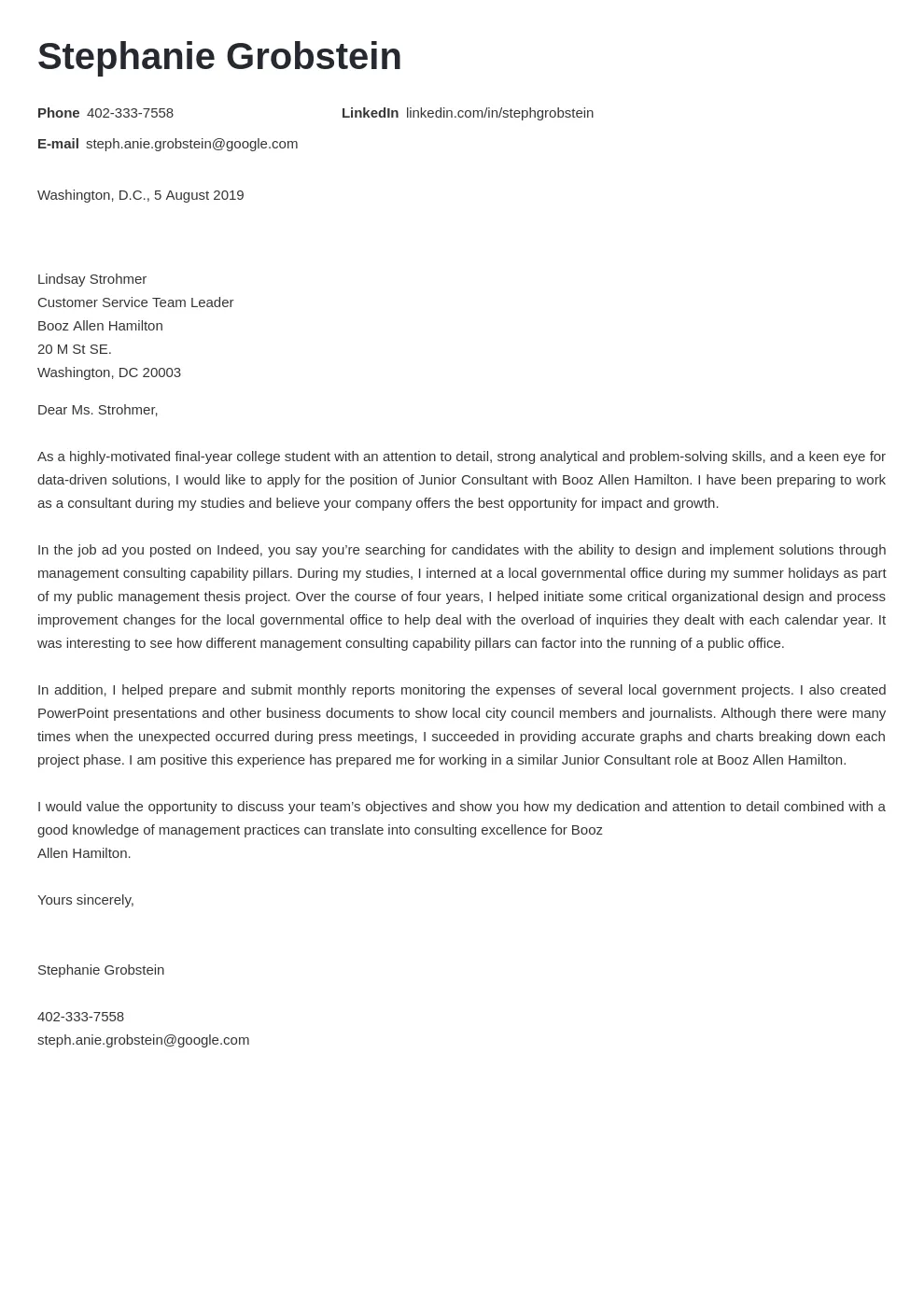
The opening paragraph is your chance to make a strong first impression. Start with a brief but impactful statement that grabs the reader’s attention. Express your genuine interest in the specific consulting role and the firm. Consider mentioning a specific aspect of the firm’s work that resonates with you or a recent achievement that impressed you. Clearly state the position you are applying for and how you learned about it. Briefly highlight your key skills or experiences that align with the job requirements, demonstrating your suitability for the role. Avoid generic openings; instead, create a narrative that showcases your enthusiasm and makes the hiring manager want to read more about you. The goal is to provide a snapshot of your potential and set the stage for the rest of the cover letter.
Highlighting Relevant Experience and Skills
In the body of your cover letter, showcase your relevant experience and skills. Focus on the experiences and skills that directly align with the requirements of the consulting role. Provide specific examples of how you have applied your skills to achieve results in previous roles. Use the job description as a guide to identify the key skills and experiences the firm is seeking, and tailor your examples accordingly. Frame your experiences in a way that highlights your problem-solving abilities, analytical skills, and ability to work effectively in a team. Consider using the STAR method (Situation, Task, Action, Result) to structure your examples, making them more compelling and memorable. Quantify your achievements to make them more impactful.
Quantifying Your Achievements
Quantifying your achievements is essential to demonstrate the impact you’ve made in previous roles. Instead of just stating what you did, provide concrete numbers and metrics to support your claims. Use data to illustrate your accomplishments and how you’ve contributed to previous company’s success. For example, instead of saying ‘Improved sales,’ state ‘Increased sales by 20% in one quarter.’ This helps the hiring manager understand the tangible results you’ve delivered. Use numbers to illustrate your efficiency, such as ‘Managed a budget of $5 million’ or ‘Reduced project completion time by 15%.’ This provides concrete evidence of your abilities and adds credibility to your application. These quantifiable results make your cover letter far more persuasive.
Demonstrating Your Understanding of the Firm
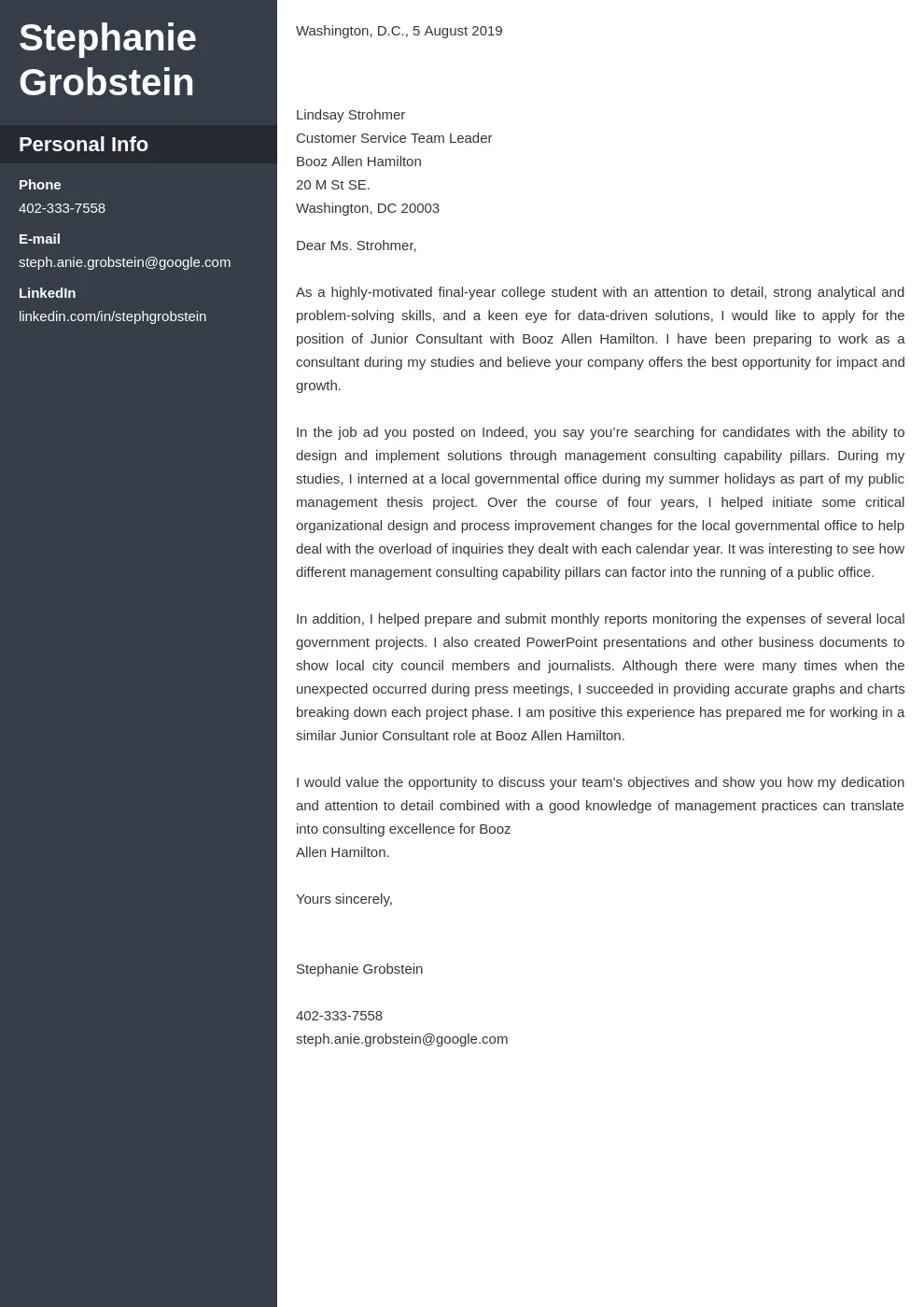
Demonstrating your understanding of the consulting firm is crucial. Research the firm thoroughly, including its mission, values, recent projects, and culture. In your cover letter, mention specific aspects of the firm’s work that resonate with you. This shows that you are not just applying for any job but are genuinely interested in the firm. Highlight how your skills and experiences align with the firm’s values and the specific needs of the role. Show that you understand the firm’s clients and the types of challenges they face. This demonstrates that you’ve done your homework and have a clear understanding of the firm’s industry and its positioning in the market. This level of understanding can significantly increase your chances of getting an interview.
Expressing Enthusiasm and Fit
Throughout your cover letter, express your enthusiasm for the role and the firm. Let your passion for consulting shine through, making the reader excited about your potential. Clearly articulate why you are interested in this specific opportunity. Mention your admiration for the firm’s work, culture, or values. Show how your skills and experiences make you a good fit for the company and the role. Connect your personal career goals to the firm’s mission, demonstrating your long-term commitment and how you plan to contribute to their success. Be authentic and genuine in your expression, allowing your personality to come through in the writing. Your enthusiasm can make a lasting impression on the hiring manager.
Closing Your Cover Letter Effectively
Conclude your cover letter with a confident and professional closing. Reiterate your strong interest in the role and the firm. Summarize your key qualifications and why you believe you are a good fit. Express your enthusiasm for the opportunity to discuss your qualifications further. Include a call to action, such as ‘I am eager to discuss how my skills can contribute to your team’s success.’ Provide your contact information again and thank the hiring manager for their time and consideration. Maintain a tone of professionalism, leaving a lasting positive impression and making it easy for the hiring manager to take the next step. Ensure that your closing reinforces your desire to join the firm.
Proofreading and Editing Your Cover Letter
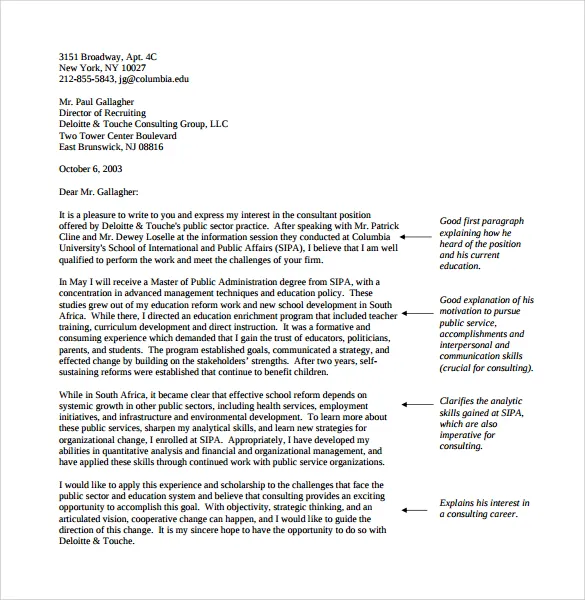
Before submitting your cover letter, meticulously proofread and edit it. Check for any grammatical errors, spelling mistakes, and typos. Ensure your language is clear, concise, and easy to understand. Ask a friend, mentor, or career advisor to review your letter for feedback. Ensure that your formatting is consistent and professional, including font size, margins, and spacing. A polished cover letter shows attention to detail and demonstrates your professionalism. Carefully review your cover letter to make sure that you are happy with the final product. Errors can give the impression that you don’t pay attention to detail, which can damage your chances of securing the role.
Tailoring Your Cover Letter for Each Firm
Tailor your cover letter for each consulting firm you apply to. Avoid using a generic cover letter for multiple applications. Research each firm and customize your letter to reflect your understanding of its specific needs, values, and culture. Highlight how your skills and experiences align with the specific requirements of the role and the firm’s mission. Mention specific projects or achievements that relate to the firm’s work. This level of personalization shows your genuine interest and increases your chances of getting an interview. This extra step can make all the difference in a competitive job market.
